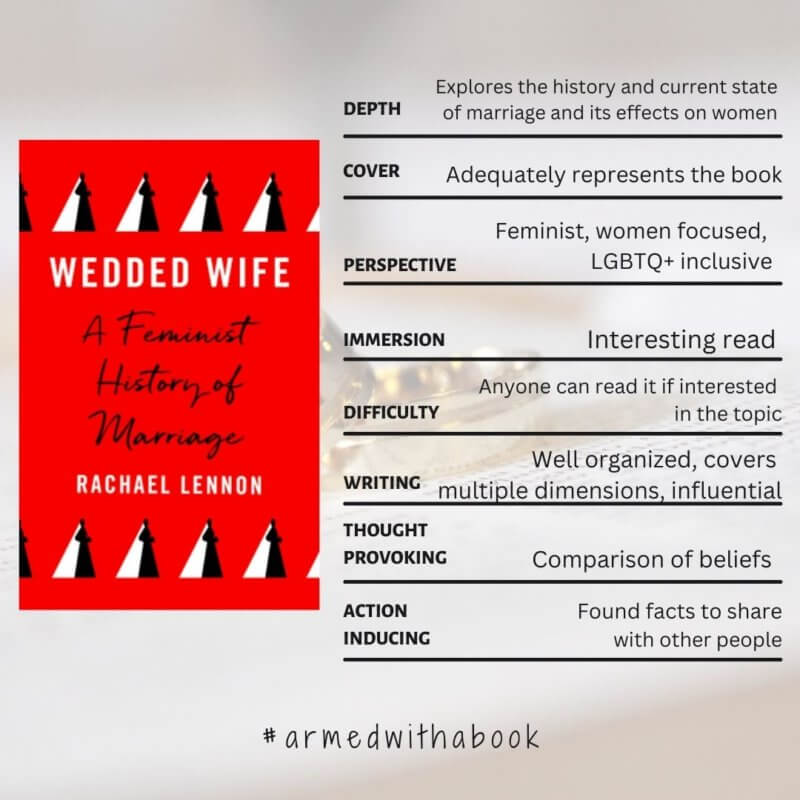Welcome, friend! Some weeks back I had posted about Wedded Wife: A Feminist History of Marriage by Rachael Lennon. Today, I am on tour with Random Things Tour and bring you this interview with the author. First, let’s do a quick refresher of the book.
Wedded Wife: A Feminist History of Marriage

By Rachael Lennon | Goodreads
In this fascinating feminist history, Rachael Lennon tells a remarkable story of how this institution has developed from the ancient customs of the stone age through to the modern form it takes today.
In this eminently readable and relatable study, Lennon also explores themes such as the pressure to marry, the politics surrounding proposals, the spectacle of marriage, the business behind it, and the politics tied to consummation as well as issues such as taking a man’s name, the nuances of marriage vows and obedience, ‘having it all’ and trying to keep up the fight to have an enduring marriage.
Having married her wife just a few years after the legalisation of same sex marriage in the United Kingdom, Lennon interweaves her own personal experiences of marriage with stories and anecdotes from throughout history to explore how marriage has transformed over the years.
In shaking off patriarchal expectations, Rachael examines marriage’s troubling past and celebrates a more joyful present, celebrating the feminist activists who have fought to make marriage a pure and equitable celebration of love, open to everyone regardless of gender or sexuality.
She also asks what compels us to keep making this choice? Can we let go of the gendered baggage that we have inherited? Can we hold true to feminist values as we commit to our partners? And what does that look like? How can we build on the past to continue to redefine marriage for the future?
Read my review here. Wedding photos included!
Hi Rachael! Welcome to Armed with A Book. Thank you so much for taking out time to talk to me. Please tell me and my readers a bit about yourself.

Hi! I’m a curator and writer with particular experience in sharing histories that have been hidden or censored in the past. In 2017 I curated a national programme of exhibitions, events, publications and artist works for the National Trust called Prejudice and Pride – it shared LGBTQ+ histories of the National Trust for the first time. I went on to curate Women and Power, marking 100 years of women’s right to vote in the UK.
I live in Durham with my wife and two children.
How did the idea of Wedded Wife come to be? What made you pursue it?
I married my wife in 2017, three years after the first same sex marriages in Scotland, England and Wales. Marrying a woman meant that the expectations that can come with proposals, engagement and wedding planning just didn’t fit. It made it easy to question the templates and narrow definitions of marriage and traditions that we inherit.
I was interested in exploring my own motivations for joining this complex institution.
What does it mean to write a feminist history of a topic?
Feminism can mean different things to different people. I have centred the experiences of women, and people who defied gender norms, in this book. It is written with their voices, stories and perspectives at its heart.
Often when researching a topic, I find myself particularly attracted to some aspects of it. Was there a rabbit hole like that for you in this book? A chapter you could not stop looking into more?
I wrote a lot of the book pregnant, and with a small toddler. The chapter on marriage and parenthood really sucked me in. The fact that, for so many women, their right to access their children was stolen from them on marriage came up time and again – as well as the risks of uncontrolled pregnancies and childbirth. There was quite a bit of editing down of that chapter!
Of all the chapters in Wedded Wife, was there one you enjoyed writing the most?
The final section was interesting to write – I enjoyed building on the historic narratives to look more closely at the present and into the future.
What was the most challenging part of writing this book?
Time! I think that’s true of most writers. For me, balancing research and writing with work commitments and parenthood was tricky.
If there was one thing readers could take away from your book, what would you want it to be?
There is no one traditional way to do anything in marriage – or weddings, or proposals, or relationships. Don’t let ideas of ‘traditional’ push you into making choices that aren’t right for you.
Can you recommend some fiction novels that have queer relationships?
Sarah Waters has written some excellent novels that explore fictional lesbian and queer relationships in the past.
Thank you for taking the time to chat with me.
Thank you for hanging out with Rachael and me. Connect with her on Twitter.
Many thanks to Random Things Tours for giving me a chance to highlight this book on my blog in exchange for an honest review. Check out other reviewers on the tour:

My reading experience of this book:

Cover image from Unsplash

Thanks for the blog tour support x